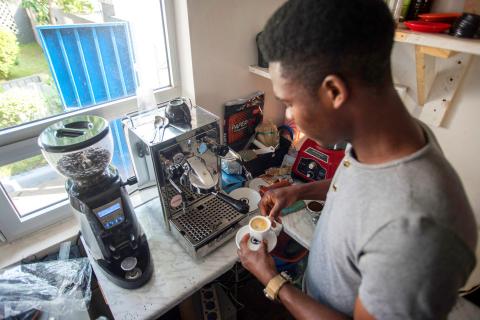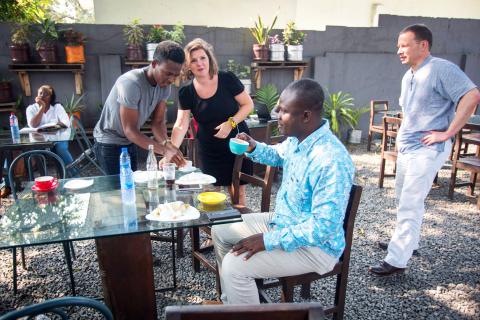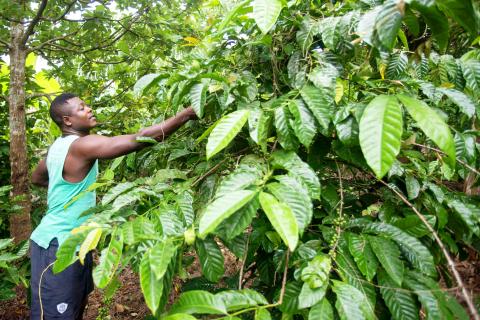Like many people around the world, 80-year-old Kofi Afadi can’t start his morning without a cup of coffee.
“Every morning when I take coffee I feel happy and go about my day,” the farmer said in his village in the green hills between Lake Volta in Ghana and the border with Togo.
“When there is no coffee it seems I am the most miserable person around here,” he said.

Photo: AFP / Cristina Aldehuela
In common with many of his fellow coffee farmers, Afadi, whose dark hair and mustache are speckled white, also grows cocoa — Ghana’s biggest crop.
The country is the second largest cocoa exporter in the world behind neighboring Ivory Coast.
Production of coffee, which was introduced to Ghana at the same time in the 18th century, trails in comparison.

Photo: AFP / Cristina Aldehuela
But it has rebounded in recent years, thanks to a growing overseas demand and a blossoming domestic market that is giving farmers hope of growing a major cash crop.
DRINKING LOCAL
A collapse in the price of coffee in the 1980s caused many Ghanaian farmers to abandon the crop, according to Michael Owusu-Manu, a researcher at Ghana’s Cocoa Board.

Photo: AFP / Cristina Aldehuela
But a government scheme launched in 2011 to revive the sector has transformed production and marketing of Ghanaian coffee.
It led to 2,400 hectares of new and revitalized coffee plantations, with farmers attracted by the introduction of fair prices for the crop.
Owusu-Manu said the impact of the scheme is easy to overlook because much of Ghana’s coffee is sold in west Africa and does not appear in official export statistics. The beans that stay in Ghana are sold to local roasters, who must compete in a market where most coffee is imported. Owusu-Manu now wants to connect local cafes popping up in Accra with local sellers.
Afadi hopes government support and a planned coffee farmers’ association will help them to wean locals off imports and establish Ghanaian beans in the home market.
FAMILY TRADITION
Ghanaian coffee is a matter of heritage and personal pride for the country’s farmers.
Afadi’s coffee farm in Leklebi Fiape, some 200km northeast of the coastal capital, Accra, is on the same plot where his father grew coffee in the 1920s.
As a child, he remembers watching his father roast and grind his own beans, transforming them into a rich black brew — just like the ones he enjoys every day. He is disdainful of the jars and single-serving sachets of instant coffee granules found on sale in supermarkets and shops.
“It doesn’t taste like coffee,” he says firmly. For now he gets his coffee from neighboring farms, including the one run by nursery manager George Klu. But Afadi is in the process of planting 900 seedlings that the government gave him for free. He expects to harvest his first crop in four years’ time when he hopes global demand will only be higher.
The International Coffee Organization reports that global annual coffee consumption has grown an average of 1.3 percent every year since 2012.
GROWN IN GHANA
Klu, 60, has two coffee farms and runs the nursery that produces the coffee seedlings for the government program. He also hopes that coffee will be a silver bullet to Ghana’s burgeoning youth unemployment.
“Our youth are trying to be reluctant about farming,” he said, cutting back weeds with a machete.
“But I may say it is just not wise for them to do so because farming is a lucrative business.” Local coffee retailers such as Kawa Mako may be part of the solution to boosting the local market.
The small coffee shop he runs was set up with local farmers in mind and proudly makes lattes, espressos, and Americanos with beans from Volta Region farms. Manager Prince Twumasi Asare said he has seen coffee consumption grow across Ghana, especially as international chains such as South Africa’s Vida e Caffe and Canada’s Second Cup have set up shop in Accra. “We want to export, to put our products in shops and malls across the country. We want people to know that coffee from Africa, from Ghana, is [of] high quality,” said Asare.

Growing up in a rural, religious community in western Canada, Kyle McCarthy loved hockey, but once he came out at 19, he quit, convinced being openly gay and an active player was untenable. So the 32-year-old says he is “very surprised” by the runaway success of Heated Rivalry, a Canadian-made series about the romance between two closeted gay players in a sport that has historically made gay men feel unwelcome. Ben Baby, the 43-year-old commissioner of the Toronto Gay Hockey Association (TGHA), calls the success of the show — which has catapulted its young lead actors to stardom -- “shocking,” and says

The People’s Republic of China (PRC) invaded Vietnam in 1979, following a year of increasingly tense relations between the two states. Beijing viewed Vietnam’s close relations with Soviet Russia as a threat. One of the pretexts it used was the alleged mistreatment of the ethnic Chinese in Vietnam. Tension between the ethnic Chinese and governments in Vietnam had been ongoing for decades. The French used to play off the Vietnamese against the Chinese as a divide-and-rule strategy. The Saigon government in 1956 compelled all Vietnam-born Chinese to adopt Vietnamese citizenship. It also banned them from 11 trades they had previously

Inside an ordinary-looking townhouse on a narrow road in central Kaohsiung, Tsai A-li (蔡阿李) raised her three children alone for 15 years. As far as the children knew, their father was away working in the US. They were kept in the dark for as long as possible by their mother, for the truth was perhaps too sad and unjust for their young minds to bear. The family home of White Terror victim Ko Chi-hua (柯旗化) is now open to the public. Admission is free and it is just a short walk from the Kaohsiung train station. Walk two blocks south along Jhongshan

Snoop Dogg arrived at Intuit Dome hours before tipoff, long before most fans filled the arena and even before some players. Dressed in a gray suit and black turtleneck, a diamond-encrusted Peacock pendant resting on his chest and purple Chuck Taylor sneakers with gold laces nodding to his lifelong Los Angeles Lakers allegiance, Snoop didn’t rush. He didn’t posture. He waited for his moment to shine as an NBA analyst alongside Reggie Miller and Terry Gannon for Peacock’s recent Golden State Warriors at Los Angeles Clippers broadcast during the second half. With an AP reporter trailing him through the arena for an